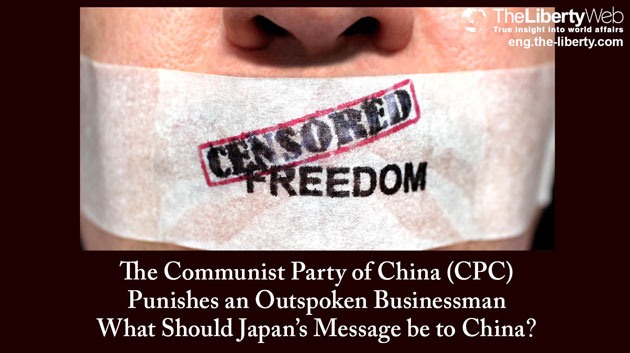The Communist Party of China Punishes an Outspoken Businessman
What Should Japan's Message be to China?
The Xicheng district committee of CPC in Beijing announced that it would place a property tycoon, Ren Zhiqiang, under one-year probation because he posted remarks online criticizing Chinese President Xi Jinping’s media control.
Mr. Ren, a retired chairman of Huayuan Property Co., is known for his outspoken criticism of the Communist Party and called “China’s Donald Trump” or an “outspoken businessman.” He had more than 37 million followers on Weibo, a Chinese Twitter-like microblogging website.
In February of this year President Xi Jinping visited major state media outlets, stressing that the media bear the surname of the Party. Mr. Ren challenged Xi Jinping’s attempt to further tighten controls of the country’s media and posted messages on Weibo, saying that China’s news media must represent and serve the public’s interest. After that, the Cyberspace Administration of China ordered the cancellation of Ren’s social media accounts.
In April of this year, President Xi made remarks in his speech at a symposium on cyberspace and informatization, saying, “For well-meant criticism raised on the Internet, be it at the overall work of the Party and the state, or at individual officials, be it gentle or harsh-sounding, we will not only welcome them, but also carefully study them for future references.” He ordered officials to heed public opinions using the Internet.
Reform-minded intellectuals raised questions about the fact that Ren’s punishment ran contrary to Xi’s remarks.
Mao Zedong’s “The Hundred Flowers Movement”
Mao Zedong was also the person who said that he welcomed criticism.
In 1956, at the Supreme State Conference, Mao encouraged the citizens to openly express their opinions of the communist regime, expressing his support for “The Hundred Flower Movement.” The movement was supposed to let various cultures bloom and a hundred schools of thoughts contend.
In response to this, the intellectuals at that time began to speak out against the Chinese Communist Party, and finally came to publicly criticize Mao’s leadership.
Then, Mao Zedong abruptly changed course and ordered a halt to the campaign. He accused the intellectuals who criticized Mao and the Communist Party of plotting against the socialist regime, and labeled them as “rightist.” In the Anti-Rightist Movement that followed, Mao thoroughly persecuted those dissident intellectuals.
Xi Jinping who attempts to cultivate a personally cult and concentrate power in his own hands is often compared to Mao Zedong. We must not take at face value his remarks such as “We will welcome well-meant criticism of the Communist Party” or “The officials should heed public opinions online.”
“Information Disclosure” and “Freedom of Speech” Will Collapse the Communist State
In China about 700 million people, about half of the population, are Internet users.
Despite the intensifying control of Internet, the Chinese people can exchange information by every possible means and have access to the media of other countries. It would be difficult to contain all those movements.
The Chinese communist regime is one-party domination and appears strong. However, similarly to the information disclosure called “glasnost” that led to the fall of the Soviet Union, this domination is likely to collapse once many people become aware of the reality of the Communist Party dictatorship such as human-rights violations and various straitjacketed policies.
In order to save the Chinese people that are suffering under this oppressive communist regime, it is important for Japan, the U.S., and other countries to convey the importance of liberty and democracy to those who are struggling for democratization in China. Now is the time to work to reform the China’s political system both from within and outside the country.


![The Laws of Justice:How We Can Solve World Conflicts and Bring Peace [Kindle ebook] by Ryuho Okawa/Buy from amazon.com](/files/2016/04/160426_kindle-amazon.jpg)

















